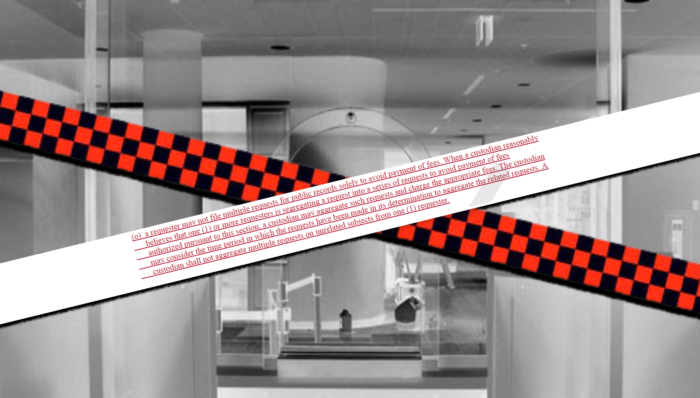A proposed tweak to the regulations governing access to public records in Massachusetts could mean more fees for journalists and others who regularly request government records
Earlier this month, officials from the Massachusetts secretary of the Commonwealth’s office held a hearing on various proposed changes to regulations governing access to public records in Massachusetts, one of which would allow state and local governments to combine “related” requests if they “reasonably believe” the requester made separate requests in order to “avoid” fees.
When state lawmakers last updated the public records law in 2016, they put many limits on the fees that state and local governments could charge for complying with records requests. One limit is that state agencies cannot charge for the first four hours of personnel time necessary to comply with a request, and cities and towns with a population greater than 20,000 cannot charge for the first two hours. The newly proposed language would appear to give discretion to record access officers to sidestep this limit in some circumstances.
At the hearing, I testified that the language should be removed or at least heavily reworded.
The legislature already created rules and remedies to prevent state and local governments from becoming overly burdened by the cost of complying with public records requests.
As I said in my written testimony: “It is not necessary to create a new rule not envisioned by the legislature to address this perceived issue of people trying to ‘avoid’ fees. If the legislature wanted to give [state] agencies and municipalities the ability to aggregate requests, it would have included language in the bill it unanimously passed.”
The proposed subsection sends the wrong message by encouraging records access officers to be suspicious of requesters and think of them as potential scammers, even though making multiple records requests is a legitimate use of the public records law.
The proposed language could conflict with state law, which requires that state and local governments respond to public records requests within 10 business days. The language does not say when the response is due if a records access officer combines requests that were made on different days. As I wrote:
If someone makes a request on a Monday then makes a request the following Monday and the [records access officer] decides to aggregate these two requests, when is the response due? Is it due 10 business days after the first request or 10 business days after the second request? If the response is due 10 business days after the second request, that means the [RAO] has additional time to comply with the first request that is not permitted under the law.
The subsection says it applies when “one (1) or more requesters is segregating a request into a series of requests to avoid payment of fees,” which would seemingly allow records access officers to combine requests from different people.
I testified that if records access officers are to be permitted to combine requests, there should be objective criteria for when it is appropriate to do so—including requiring that the requests were submitted within a specific time frame relative to one another, providing guidance on how much requests must have in common before they can be considered “related,” and requiring records access officers to explain themselves when they combine requests. From my testimony:
This proposed clause is much too vague and will lead to confusion about when it is appropriate to aggregate requests. It will also lead to more appeals, which will create more work for requesters, the public records division [of the secretary of the Commonwealth’s office], and, ironically, the [records access officers] who choose to aggregate requests. It will also lead to delays for requesters, which undercuts the central purpose of the public records law to make information as accessible to the public as possible.
A recent Monday hearing was held via Zoom. Although it was held open for two hours and a number of people attended, only two testified—the other person being John Hawkinson, a freelance journalist from Cambridge. Hawkinson, who spoke first, also criticized the proposed language about combining requests, saying “[i]t gives the [records access officer] a lot of discretion without clear limit” and could impact “a very common category of requests.”
Hawkinson continued: “It is common for requesters to regularly submit periodic requests, e.g. monthly requests for a mayor’s calendar, or weekly requests for a city manager’s emails, etc. Although oftentimes mundane and boring, these kinds of public records are some of the most important for transparency of regular government operations. They are also some of the least burdensome for custodians because they are predictable and the product of a well-oiled machine.”
Hawkinson suggested that the language be updated to clarify that the requests must be “contemporaneous” to be combined.
In addition to the oral testimony, written testimony was submitted by Peter Sumners, a lawyer with the Braintree firm Murphy, Lamere & Murphy. Sumners said via email that he represents “a number of public entities throughout Massachusetts, and that work often includes advice on and assistance with public records laws,” but that he was not testifying on behalf of any public entity. “My comment contains my personal views on the proposed changes—no one asked me to submit it.”
Sumners also criticized the language about combining requests. He wrote that it is confusing and will lead to more appeals, because it doesn’t define what it means for requests to be “related” or make it clear who determines whether requests are related. Sumners added that records access officers would be “forced to make a guess as to the relationship of multiple requests,” and that requesters might lie about whether their requests are related to avoid fees.
Sumners explained: “If [a records access officer] is to rely solely on representations of the requester in determining whether requests are related, no sensible requester would subject themselves to fees by providing this information. Nothing in the public records law or its regulations discourages dishonest behavior by a requester in these circumstances … nor does there appear to be any mechanism for an RAO to charge a fee after the fact if requests cannot initially be aggregated because the requester is silent or dishonest about their relationship.”
The hearing was chaired by Supervisor of Public Records Rebecca Murray, who heads the public records division and is responsible for all appeals.
The proposed regulations can be read here. The written testimony can be read here.
Andrew Quemere has been making public records requests in Massachusetts for more than a decade. He writes The Mass. Dump Dispatch, a newsletter about public records. Subscribe to read about the latest developments in government transparency. Follow him on Twitter @andrewqmr.


